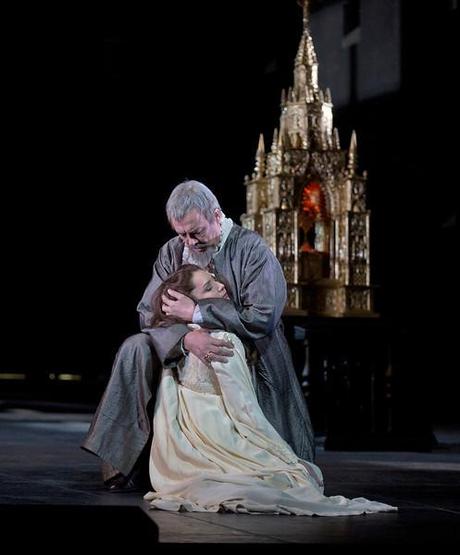
Filippo (Furlanetto) mourns what might have been.
Frittoli is Elisabetta. Photo (c) Met Opera
The chorus, bless them, sang strongly, though deprived of their first ensemble and dangerously disconnected from the pit at the auto da fe. Although Anna Smirnova is not a subtle Eboli, she sounded more secure than in her first run. Her intonation was still occasionally off, and her vibrato, to me, could be distractingly wide, but she acquitted herself respectably in the challenging role. Dmitri Hvorostovsky's Posa was somewhat bland despite rich tone and elegantly spun legato lines. A cold, proud precision made this Posa a primarily political figure; little of the poignant intimacy with Carlo emerged (alas,) and I got little sense of whence Posa derived his passion. I've seen Hvorostovsky give nuanced dramatic performances while in lazily directed revivals, but this was not one of them. Ferruccio Furlanetto's Filippo was of extraordinary power and subtlety both vocally and dramatically; in the imperious, melancholy king he found a figure of tragic grandeur. He was eloquent in gesture and movement, and irresistibly compelling. Even before Filippo's great scene, his vulnerability was painfully apparent, and "Ella giammai m'amo" was spell-binding. Furlanetto's use of Italian was masterful, in clipped command as in refulgent phrases; it was from him that I received the strongest sense of what was at stake in the opera's personal relationships. Barbara Frittoli shaped her phrases elegantly as Elisabetta, and colored her tone expressively. She handled the dangerous passages of "Tu che le vanita" courageously; I'm inclined to blame the (lack of) direction for the fact that this was not as coherent or compelling as other work of Frittoli's I have seen. In the title role, Ramon Vargas sang with his customarily sensitive musicianship, and sweet, bright tone. His solid, conscientious performance was praiseworthy, and yet far from fully evoking the unstable, passion-ruled prince. Indeed, all of the principals (with the exception of Filippo, the conscience-tortured tyrant) seemed surprisingly sensible, and, to modify W.H. Auden's famous quip, opera is never at its best when its participants seem sensible.

